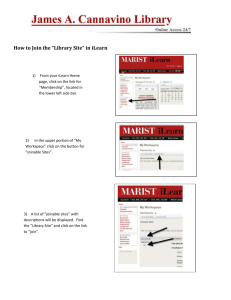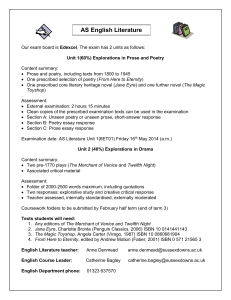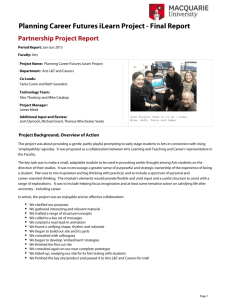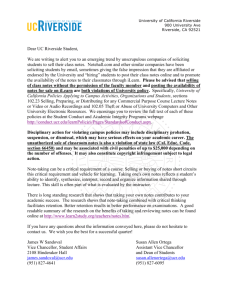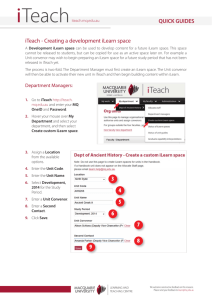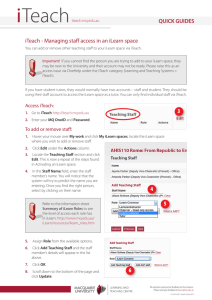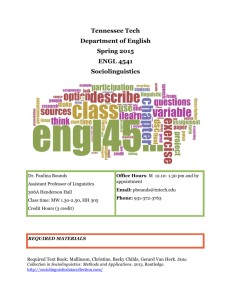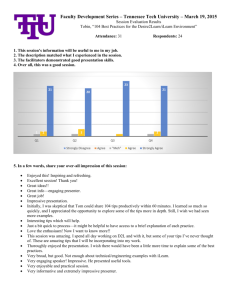Environmental Law and Policy: ENVS 450.02 Fall Semester, 2012
advertisement
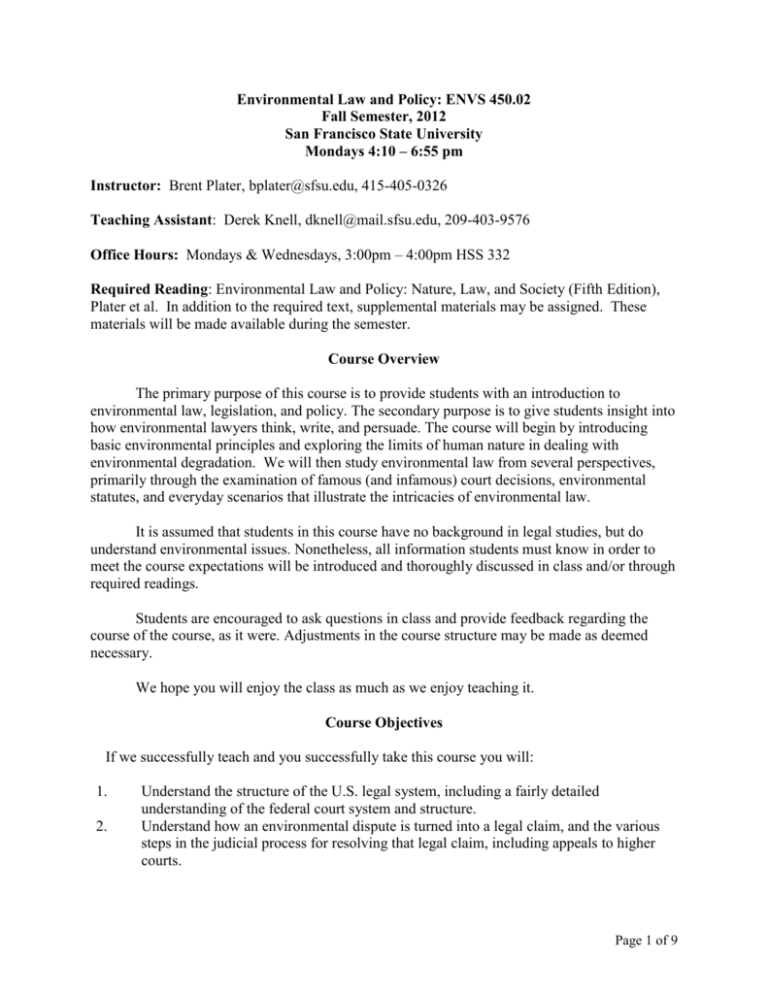
Environmental Law and Policy: ENVS 450.02 Fall Semester, 2012 San Francisco State University Mondays 4:10 – 6:55 pm Instructor: Brent Plater, bplater@sfsu.edu, 415-405-0326 Teaching Assistant: Derek Knell, dknell@mail.sfsu.edu, 209-403-9576 Office Hours: Mondays & Wednesdays, 3:00pm – 4:00pm HSS 332 Required Reading: Environmental Law and Policy: Nature, Law, and Society (Fifth Edition), Plater et al. In addition to the required text, supplemental materials may be assigned. These materials will be made available during the semester. Course Overview The primary purpose of this course is to provide students with an introduction to environmental law, legislation, and policy. The secondary purpose is to give students insight into how environmental lawyers think, write, and persuade. The course will begin by introducing basic environmental principles and exploring the limits of human nature in dealing with environmental degradation. We will then study environmental law from several perspectives, primarily through the examination of famous (and infamous) court decisions, environmental statutes, and everyday scenarios that illustrate the intricacies of environmental law. It is assumed that students in this course have no background in legal studies, but do understand environmental issues. Nonetheless, all information students must know in order to meet the course expectations will be introduced and thoroughly discussed in class and/or through required readings. Students are encouraged to ask questions in class and provide feedback regarding the course of the course, as it were. Adjustments in the course structure may be made as deemed necessary. We hope you will enjoy the class as much as we enjoy teaching it. Course Objectives If we successfully teach and you successfully take this course you will: 1. 2. Understand the structure of the U.S. legal system, including a fairly detailed understanding of the federal court system and structure. Understand how an environmental dispute is turned into a legal claim, and the various steps in the judicial process for resolving that legal claim, including appeals to higher courts. Page 1 of 9 3. 4. 5. 6. 7. 8. 9. 10. 11. 12. Understand several different theories or approaches lawyers, legal theorists, and judges use to bring, critique, or decide cases. Learn how to find, read, analyze, and critique judicial opinions. Understand the constitutional constraints on crafting federal environmental laws. Learn about the role administrative agencies play in interpreting and adapting laws passed by Congress through agency rulemaking and adjudication. Learn about the “common law,” its strengths and weaknesses for resolving environmental disputes, the consequences various “tort reform” measures may have on environmental lawsuits, and the common law’s influence on environmental statutes. Learn the structural approach taken by several federal environmental statutes, and their most important operative sections. Learn how to think and write clearly, and how to use your thinking and writing skills when addressing legal questions or working with lawyers. Learn how to apply the lessons from past legal cases to predict outcomes in new (future) factual circumstances. Learn the definition of many specialized legal words. Sharpen what you know and understand what you believe. Favorite Legal Stimulant Program Due to the schedule and length of each class period, it is anticipated that students may, from time to time, become drowsy or inattentive, despite our best efforts to remain simultaneously entertaining and informative. To combat this unfortunate state of affairs, we will institute a “Favorite Legal Stimulant” program during this course. Under this program, a volunteer (or two) will bring their favorite legal stimulant to class in quantities abundant enough to share with the entire class for the duration of the lecture. For example, a few pounds of chocolate covered espresso beans would be appropriate. Because this class is open to freshman (who may not yet be of age), because bringing such substances to class would violate school policy, and because alcohol is a depressant, not a stimulant, nicotine and alcohol, in addition to all other substances regulated by applicable law, will not be considered legal for the purposes of this program. Expectations and Grading We believe that the process of engaging difficult material is an important exercise, and the value of that exercise often remains with students long after the content of the course material has been forgotten. For that reason we’ve designed a difficult course. However, the course is graded on a curve. Thus, it is possible that a 60% score on a quiz may deserve an “A,” based on the overall difficulty of the quiz and the standing of your peers. The point is that low raw numbers do not necessarily equate with low grades in this course: if you engage the material and the course, there is a high probability that you will succeed. Conversely, if you are looking for a way to tune-out on your Wednesday evenings, this is probably not the course for you. Students are expected to abide by the school honor code. Anyone caught signing-in another student on attendance sheets will be penalized. Anyone directing another student to sign them in despite their absence will also be penalized. Cheating on quizzes and/or the final exam will not be Page 2 of 9 tolerated. It is disrespectful to us and your fellow students, and will be punished swiftly and severely. You will be graded according to the following criteria: Class participation: Case presentation: Case briefings: Mid-term exam: Draft annotated paper outline: Final paper: Final exam: 10% 10% 10% 10% 20% 20% 20% We intend to grade you on these criteria as follows: Class Participation: Your class participation grade will be based on your attendance and the quality and quantity of your class conduct. Class attendance is required. If you have more than 2 unexcused absences in the semester, you may not pass the course, regardless of how well you score on other class requirements. We will be keeping track of attendance and class participation, the quality of which will be enhanced greatly by completing the required reading assignments for each class, and by remembering that our time together is a commons, subject to enhancement (or degradation) by individuals to the benefit (or detriment) of the whole. A portion of your class participation will be based on keeping pace with the reading assignments: your pace will be evident by your engagement in the course. We will occasionally call on students randomly to answer questions in the Socratic tradition: providing informed, thoughtful answers to these questions, even if they aren’t necessarily correct, will also serve as evidence that you are keeping pace with reading assignments. Unless you proffer some other explanation, repeatedly failing to answer these questions when randomly called upon will reduce your class participation grade. Keep your cell phones etc. inaudible during class. Case Presentation: Each student will work in a group to debate a hypothetical legal dispute in class against another student group. One team will present a “pro” argument—acting essentially as plaintiffs' attorneys—and the other team a “con” argument, i.e., acting like defense attorneys. The issue will be based on a brief fact pattern and case statement prepared by us, but students will be required to do additional research beyond the fact pattern to formulate their arguments. Each side will be given 5 minutes to present, and then there will be 5 minutes of Q&A from the ½ of the remaining class, who will act as district court judges and determine which argument was more persuasive, and explain why. The losing side will then appeal to the other half of the class. The losing side will have 2 minutes to make its most important points regarding the district court’s error, and the winning side will have 1 minute to encourage a Page 3 of 9 rejection of the appeal. The appeal judges will then have 3 minutes to decide whether to accept or reject the appeal. A strong case presentation will frame the issue, describe the legal, moral, or other strengths of your argument, address counter-arguments, and flow logically and smoothly from point to point. Mr. Knell will help you prepare for this assignment. Case Briefings: Nearly every week you will be required to “brief” one legal case from the readings and provide a copy of the briefing by email to Mr. Knell. The email with your brief is due before the start of class. We will explain how to brief a case by working through the Boomer decision with you. This will be much more helpful to you if you read Boomer before class. Draft Annotated Paper Outline and Final In-depth Paper: Each student will be required to write an in-depth persuasive essay/argument (approximately 4,000 words, roughly 810 single-spaced pages) about a contemporary environmental policy or legal issue. This assignment requires that you have your paper topic approved, submit an annotated outline, and turn in a final paper. Review the in-depth instructions about this assignment as soon as possible. Your paper topic must be selected and approved by us on or before September 30. You must submit the outline USING TURNIT IN on or before 11:59:59 p.m. November 5. A template for a good draft annotated outline is provided for this course. Your final paper is due on or before 11:59:59 p.m. December 10. YOU MUST SUBMIT THE OUTLINE USING TURNIT IN ON ILEARN. A template for a good final paper is available on iLearn; Mr. Knell will provide more details later in the semester. Mid-term Examination: The mid-term will cover approximately seven weeks of course material. The mid-term will consist of multiple-choice, true/false, and short answer questions. It will probably look similar to many other undergraduate and K-12 examinations you have taken. Anything covered in class or in the readings—regardless of whether the reading was covered during lecture—is fair game for the exam. It is a closed-book examination. Our mid-term questions are not tricks. They are designed, to the best of our ability, to help us understand whether we have successfully helped you comprehend the course materials. Nonetheless, sometimes we write questions that an unusually high number of students fail to answer correctly. When that happens, it is usually because (a) we failed to teach you something we thought we taught you; (b) you failed to learn something you should have learned, or (c) the question was unfair. If you prove to us the question was unfair—i.e. a true/false question could be correctly answered as true or false, or more than one answer to a multiple choice question was a correct answer—we will probably give the entire class an extra point on the mid-term. Make a strong argument that our teaching was flawed, and you will likewise all be rewarded. The midterm exam will be on October 22. Final Examination: According to Academic Senate policy F76-12 a time period is set aside at the end of each semester for a formal examination period. All classes are expected to meet during the final examination period whether an examination is given or not. The final examination schedule is published each semester in the Class Schedule. The final exam for this Page 4 of 9 class will be a traditional law school exam, consisting of essay questions that require you to spot relevant facts and analyze these facts using legal concepts taught in the course. The final exam will be cumulative, but it will be “open book”: you may bring your textbook, your notes, and some other reference materials and use them during the exam. The exam will require you to write clearly and persuasively in a time-stressed environment. Details will be provided later in the semester. The final exam will be on Saturday, December 22 at 4:10pm – 6:55pm in our normal classroom. Anything covered in the readings and/or covered in class, is fair game for the exams. Do not presume that a topic assigned in the reading but ignored in class will not be tested. EXTRA CREDIT - Public Comment: Every week dozens of government bodies hold public hearings on environmental issues. These hearings nearly always have opportunities for the public to comment on the decision; typically the time allotted for such comments is between one and three minutes. Each student in this course may obtain extra credit by attending a public hearing on an environmental issue of the student’s choice 5 and providing informed comments to the government agency about the issue. The comments should be persuasive: you must conduct research on the issue, take a position about what the best resolution of the issue would be, and then support your position with reasoned analysis and relevant facts. During the next class after delivering your comments, you will be given five minutes of class time to describe the issue to your fellow students, describe the forum where you spoke, deliver your comments to your student audience, and then field questions and feedback from your students about your public comment. A maximum of 7.5 extra credit points may be awarded for this exercise, but the maximum amount will decrease as the semester progresses. For example, if you are prepared to present your comments to your students during our first class, you are eligible for 7.5 points; if you are ready only by the second class, you are eligible for 7 points; the third class, 6.5 points; etc. Graduate Writing Assessment Requirement: In order to use this course to satisfy the GWAR requirement, you must pass the course with a C grade or better. Furthermore, you must pass English 214 with a C- grade or better to use this course as your GWAR credit. Please also review the instructions for the draft annotated paper outline and final paper for further GWAR credit requirements. College of Health and Human Services Disclaimers CHSS Withdrawal Policy: The last day to drop a class is September 10th, 2012 at midnight. From September 11th-November 26th, 2012 you must submit a withdrawal petition. Withdrawal from a class after September 10th, 2012 will be considered for serious and compelling reasons only and must have accompanying documentation. The following reasons are not considered serious and compelling: Changing your major, poor performance, class not required for graduation/major, or more time needed for other classes. If you wish to withdraw from class due to unexpected changes in your work schedule, illness or family emergencies, documentation will be required, along with a copy of unofficial transcripts. If you are requesting a withdrawal, bring your petition and appropriate documentation to the instructor. From November 27th-December 17th, 2012 you may not withdraw from a class or the University, except in the case of a serious documented illness or verified accident. Page 5 of 9 CR/NC Option: October 23rd, 2012 (by midnight) is the last day to request the CR/NC option. The Associate Dean will not approve requests for changes if you miss this deadline. Late Add Policy: The period to add classes via permit numbers is August 27thSeptember 10th (midnight), 2012. The period to add classes by Exception (2nd set of permit numbers) is September 11th-24th, 2012. It is your responsibility to procure a late permit number from your instructor and add the class. Faculty cannot add you into a class. After September 24th, 2012 a Waiver of College Regulations form must be signed by your instructor, Chair and CHSS Associate Dean to add. This will be approved only if there was an administrative error. Check your registration through MySFSU: Sign up for CR/NC, drop and add classes by the appropriate deadline online through MySFSU. ALWAYS check your registration after making any changes and BEFORE deadlines to be sure you are registered properly for your classes. This is a student responsibility. Deadlines for all registration procedures, including withdrawals and requests for credit/no credit, are listed in the class schedule and will be strictly adhered to by the instructor, the Department Chair and the Associate Dean of College of Health and Social Sciences. This can be viewed on the Registration Calendar at the following website: http://www.sfsu.edu/~admisrec/reg/regsched124.html Disability Programs and Resource Center: Students with disabilities who need reasonable accommodations are encouraged to contact the instructor. The Disability Programs and Resource Center (DPRC) is available to facilitate the reasonable accommodations process. The DPRC, located in SSB 110, can be reached by telephone at 415-338-2472 (voice/TTY) or by e-mail at dprc@sfsu.edu. Page 6 of 9 Draft syllabus This syllabus may be modified during the course of the semester. 1. August 27 - Administrative Matters; Introduction to Science, Ethics, and Law pp. 3-11 or iLearn File: Environmental Perspective pp. 21-24 or iLearn File: Environmental Ethics pp. 25-30 or iLearn File: The Tragedy of the Commons pp. 59-65 or iLearn File: A Summary of Cross Cutting Themes (SKIM) iLearn File: Introduction to American Law September 3 - Labor Day. No class this week. 2. September 10 - The Nature of the Common Law iLearn File: Introduction to Legal Cases iLearn File: Briefing Cases pp. 75-79: Nuisance: Boomer et al v. Atlantic Cement Company Brief Boomer and bring your brief to class Suggested Reading: pp. 79-82 pp. 83-90: Public Nuisance: New York v. Schenectady Chemical Company pp. 97-100: Strict Liability: Branch v. Western Petroleum, Inc. Suggested Reading: pp. 100-101 pp. 95-96: Negligence 3. September 17 - Common Law Defenses and Relief; Persuasive Writing Class. pp. 106-108: Proximate Causation: Pruitt v. Allied Chemical Brief Pruitt and email the brief to Mr Knell. Suggested Reading: pp. 108-109 pp. 120-128: Punitive Damages: Exxon Shipping Company v. Baker Suggested Reading: pp. 128-130 iLearn File: The Process of Writing iLearn File: Effective Style iLearn File: Developing Persuasive Arguments 4. September 24 - Constitutional Law: Federalism, Preemption, Takings, and Hapless Toads pp. 270-277: Preemption of State Law iLearn File: San Luis & Delta-Mendota Water District v. Salazar pp. 891-900: Eminent Domain and Physical Takings pp. 904-905: Introduction to Regulatory Takings pp. 917-920: The Supreme Court’s Takings Jurisprudence 5. October 1 - Administrative Law and the National Environmental Policy Act; Deadline for Paper Topic Approval (see syllabus above) pp. 217-227: Administrative Law in a Nutshell Page 7 of 9 pp. 227-233: Judicial Review: Citizens to Preserve Overton Park, Inc. v. Volpe Brief Overton Park and email the brief to Mr. Knell. Suggested Reading: pp. 233-238 pp. 332-339: NEPA: Center for Biological Diversity v. National Highway Traffic Safety Administration Suggested Reading: pp. 339-340 pp. 261-262: Deference to Administrative Agencies: Chevron U.S.A, Inc. v. Natural Resources Defense Council Suggested Reading: pp. 262-266 6. October 8 - The Clean Water Act pp. 530-531: CWA: U.S. Environmental Protection Agency v. California Suggested reading: pp. 531-539 pp. 539-544: TBELS and NPDES: Rybachek v. U.S. Environmental Protection Agency Brief Rybachek and email the brief to Mr. Knell. Suggested Reading: pp. 544-551 Suggested Reading: pp. 523-529: The Basics of the Clean Water Act 7. October 15 - The Clean Air Act pp. 465-481: Clean Air Act: Whitman v. American Trucking Association Brief Whitman and email the brief to Mr. Knell. pp. 498-502: Clean Air Act: New Jersey v U.S. Environmental Protection Agency. Suggested Reading: pp. 502-503 8. October 22 - Mid-term Exam; Superfund and the Resource Conservation Recovery Act pp. 762-766: RCRA: Hazardous Waste Treatment Council v. U.S. Environmental Protection Agency pp. 692-693: CERCLA: United States v. Wade (Wade II) pp. 751-761: RCRA's Cradle to Grave Regulatory Framework pp. 679-691: Liability Strategies and Superfund pp. 702-707: Who’s Liable? 9. October 29 - Environmental Justice & Law iLearn File: History of the EJ Movement iLearn File: Principles of EJ iLearn File: Caste from the Past iLearn File: Environmental Justice Litigation: Another Stone in David’s Sling iLearn File: South Camden Citizens v. New Jersey 10. November 5 - Protecting Public Lands: Federal Planning Statutes and the Public Trust Doctrine; Draft Annotated Paper Outline Due (see syllabus above) pp. 866: Public Trust Doctrine: Marks v. Whitney pp. 870-875: Public Trust Doctrine: Mono Lake Decision Brief Mono Lake and email the brief to Mr. Knell. pp. 414-416: State-Federal and Public-Private Issues on Public lands: Kleppe v. New Mexico Suggested Reading: pp. 416-419 Page 8 of 9 pp. 398-400: Public Lands and Resource Planning: Norton v. Southern Utah Wilderness Alliance, et al. Suggested Reading: pp. 400-403 November 12 – Veteran’s Day. No class this week. November 19 – Fall Recess. No class this week. 11. November 26 - Protecting Public Lands: The Tightrope Act in the National Park System iLearn File: Bicycle Trails v. Babbitt Brief Bicycle Trails and email the brief to Mr. Knell. iLearn File: Fort Funston Dog Walkers v. Babbitt iLearn File: Excerpt from Leash Law Petition 12. December 3 - The Endangered Species Act pp. 430-433: ESA: Tennessee Valley Authority v. Hiram Hill, et al. Brief TVA v. Hill and email the brief to Mr. Knell. Suggested Reading: pp. 433-440 pp. 443-445: ESA: Babbitt v. Sweet Home Communities for a Great Oregon Suggested Reading: pp. 445-446 13. December 10 - Wetlands, and Zoning; Final Paper Due (see syllabus above) pp. 368-370: Section 404 of CWA: Bersani v. U.S. Environmental Protection Agency Suggested Reading: pp. 370-374 pp. 360-368, 379-382: Planning, Zoning, and Smart Growth 14. December 17 - Kyoto, Copenhagen, and Global Warming: International Law and Environmental Treaties pp. 933-937: International Law: Trail Smelter Arbitration (United States v. Canada) Brief Trail Smelter and email the brief to Mr. Knell. Suggested Reading: pp. 937-939 pp. 963-971 Climate Change Suggested Reading: pp. 971-975 pp. 482-484: Greenhouse Gas Regulation: Massachusetts v U.S. Environmental Protection Agency Suggested Reading: pp. 484-487 15. Final Exam - Saturday, December 22nd at 4:10pm – 6:55pm Page 9 of 9
